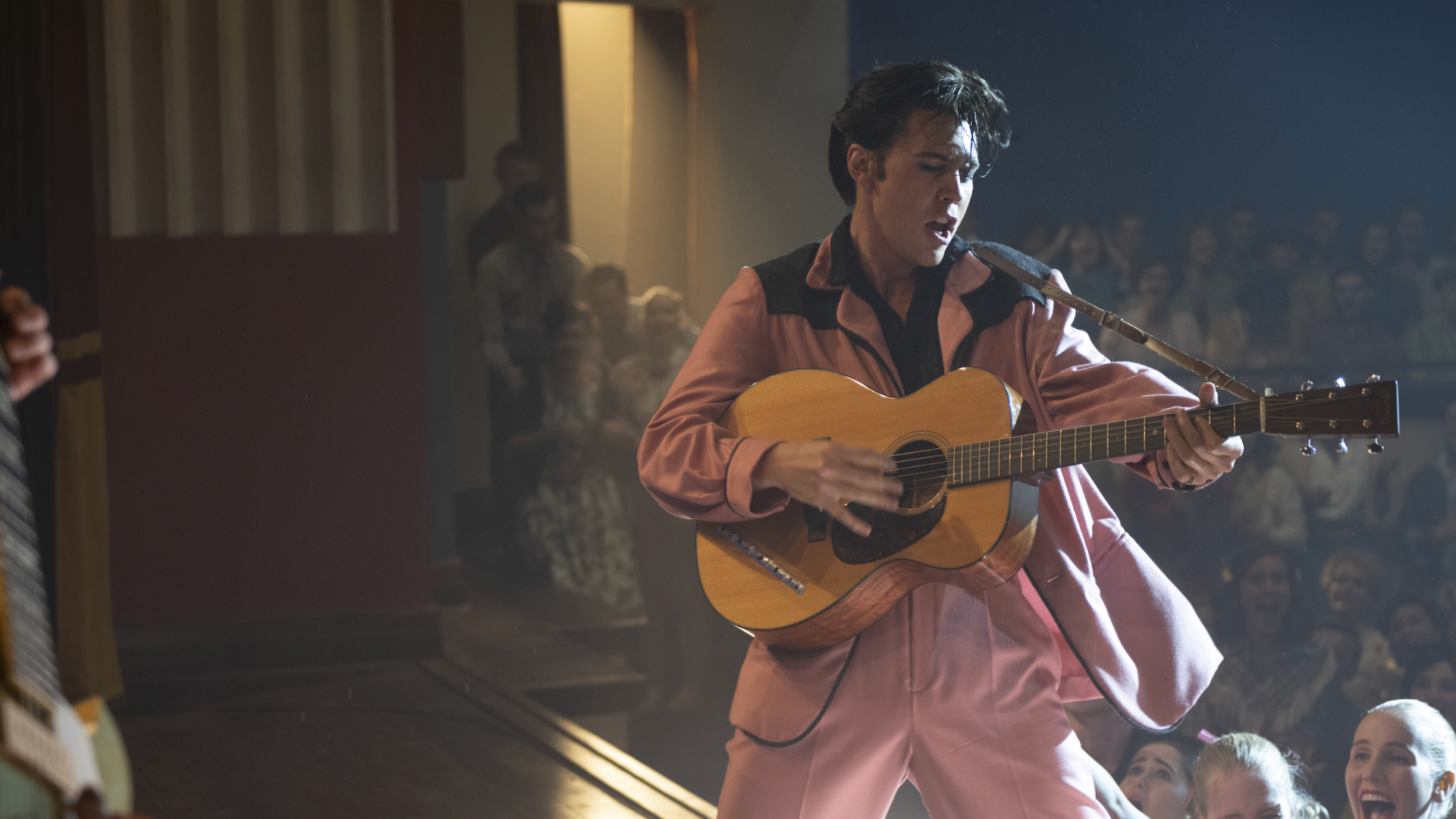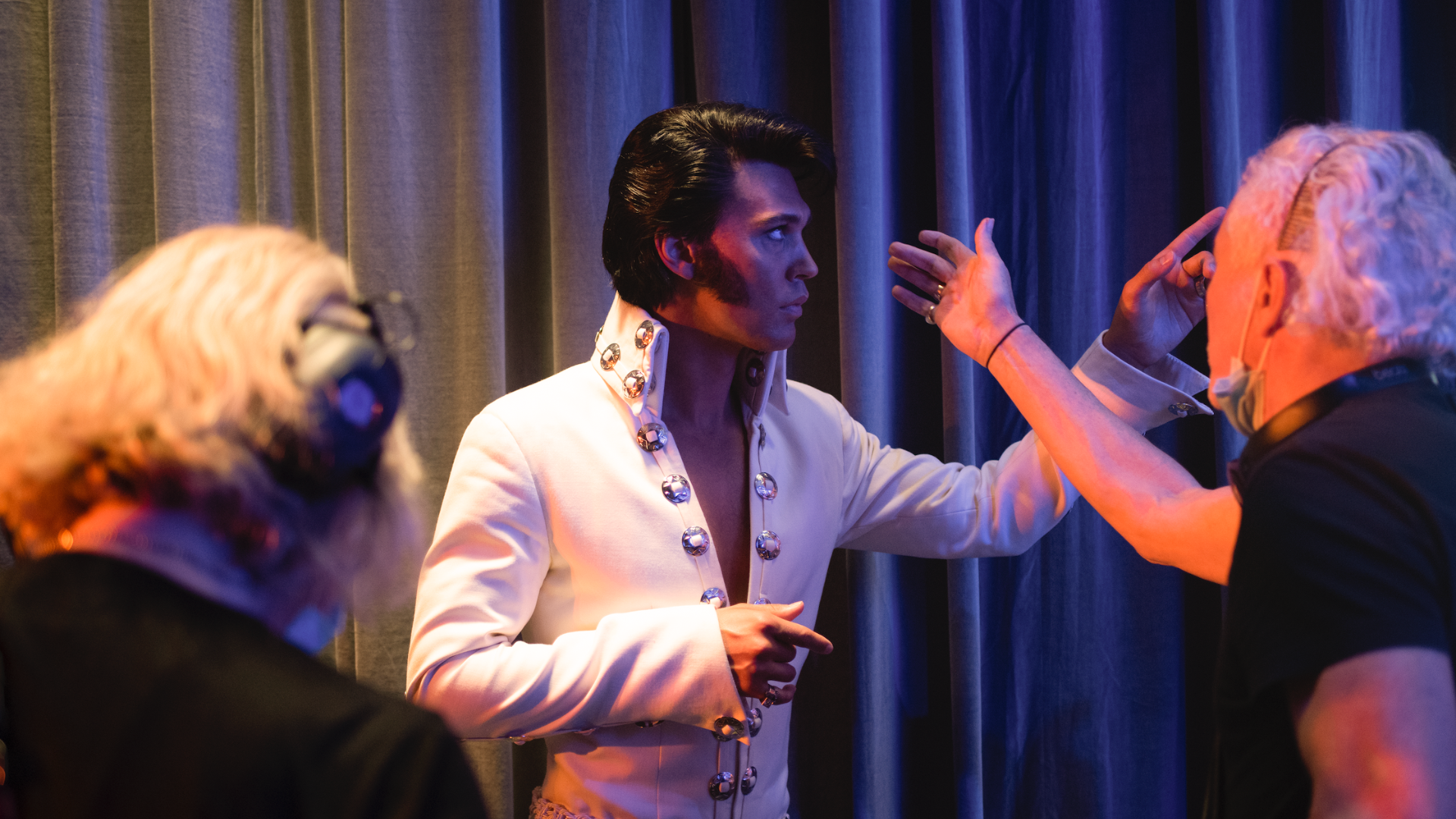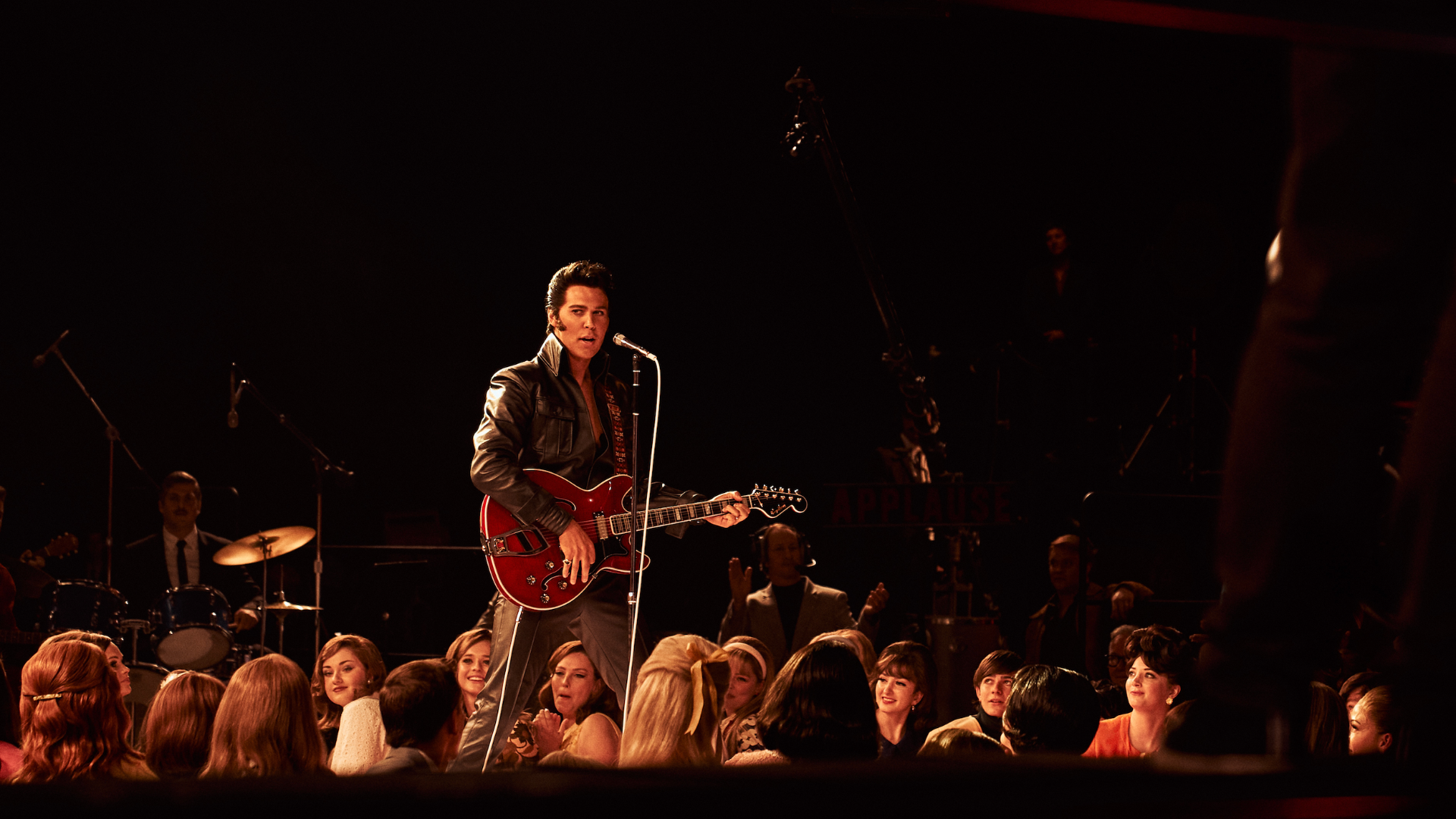Elvis actor Austin Butler talks bathrobe auditions, letter writing with Tom Hanks, and Dune 2
Total Film meets the Elvis breakout to discuss working on Baz Luhrmann's American epic

Austin Butler's still got his Elvis growl on. Wearing a black jumper, his fingers flush with chunky silver rings, and with a dirty-blonde quiff that he keeps pushing back, the actor's ready to discuss the upcoming Baz Luhrmann-directed biopic, simply titled Elvis, in which he plays the King of Rock 'n' Roll.
Speaking to Total Film over Zoom, Butler's polite and humble and just as interested in what's on TF's bookshelf as talking about his project. He responds more than once by saying ‘amaaazing’ in a slow drawl and, at one point, gets teary discussing his mother who passed away when he was 23 – the same age Elvis was when he lost his mom. Here's the full Q&A with Butler, edited for length and clarity.
Total Film: Why were you so certain you were the right person to play Elvis?
Austin Butler: There were a couple of moments before I’d ever heard that Baz was making an Elvis film that made it feel like the stars were aligning. A couple of months before I heard that he was doing it, I was driving – it was Christmastime in LA, and I was driving with a friend of mine, going to look at Christmas lights. An Elvis Christmas song was on, and I was singing along with it. And my friend reached over, and kind of had this epiphany moment. He said, "You need to play Elvis." That’s one of those things that feels like such a long shot, that I just brushed it off.
And then a couple of weeks later, I’m playing the piano at home, and kind of goofing around. And my friend was there as well, and said, "I’m serious, you need to figure out how you can get the rights to an Elvis film, and do it." And once again, I just kind of said, "That would be amazing." But it just seemed like such a long shot. And a couple of days after that, I get this call from my agent, who said, "Baz Luhrmann is making an Elvis film." All the hairs on my arm stood up. And I just thought, "There’s something here. I’ve got to just give this everything I’ve got."
How did you prep for Baz’ audition process?
I went into the research as though I had the job. And at the time, I didn’t have a job. I’d finished an acting job before that, and it’d been some months, and other auditions and stuff were coming through. But I just said, "I’m not going to audition for anything else." I turned down everything else, because I said, "I’m not going to split my energy here." I threw all my eggs into this one basket.
Bringing all the latest movie news, features, and reviews to your inbox
I started watching every documentary I could, listening to every Elvis record, reading every book that I could get my hands on that was written on him, and listening to every interview that he’d done. And there were certain keys into his humanity. Because that’s the tricky thing about it. He’s either seen as the wallpaper of society, or he’s held up to a superhuman status. Neither one of those things can you really embody as an actor. They’re both not helpful. So I was trying to find: where is his humanity? Who was he really as a man? In one of the documentaries I’d watched, it really struck me that his mom passed away when he was 23, and my mom passed away when I was 23.
At this time, my agent said, "Put something on tape for Baz of you singing, because he’s seen you acting. But put something on of you singing." I ended up doing Love Me Tender” in my bedroom, and I watched it back. I thought, "I can’t stand this impersonation." So I didn’t send it.
And then a couple of days later, I woke up from a nightmare that my mom’s alive but dying again. And it was just that thing where you just wake up, and you just feel awful. I had tears in my eyes, and I thought, "What do I do with this? What would Elvis do with that?" So I thought, "I’ll put it into music."
So I went to the piano. I started playing the piano. I set up a camera, because I thought, "This is an emotion that he would have experienced. This is something that I can actually say: 'This is true.'" I always saw 'Unchained Melody' as a romantic song, but at that point, I thought, "What if I sing it to my mom?" So I was playing the piano, and I sang it to my mom, and I recorded it. I was still in a bathrobe and everything. You know, I didn’t look like Elvis or anything. I just sent that to Baz. And that got his attention.

What was the hardest aspect of Elvis to nail? Was there one that you were like, "God, that’s the thing I really need to get right"?
It's hard to nail down one… Because the whole thing is sort of like spinning plates, as well as the fact that we weren’t just approaching one section of his life. It’s not like I could just delve into 1956 Elvis.
When you listen to Elvis’s voice – I’ll just take this as one example. If you listen to his voice over ’54 to ’77, it changes so many times. There’s distinct differences. When you listen to Elvis in 1962, he sounds different than ’54, and he sounds different than ’72. It’s different in ’77, and it’s different in ’68. And his singing voice is the same, where it changes. Later on, it’s a bit more operatic. And in ’68 – there’s a short period in ’68 where it’s really gritty. And then you listen to ’50s Elvis, and it’s very different.
So it was finding the nuance within each time period. It’s not just on a voice level. That’s his speaking voice, his singing voice, but then how his movements changed over those years as well. And then as well, on top of that, you have the fact that you don’t want to just look at the external things, and just go, "OK, he moved differently there." It was finding, "Why did he move differently? Why did he start changing the way that he spoke? What was it exactly? Is it just age, or is it a conscious thing?" And then you start hearing stories about how he would say, "I like the way that guy walks. I’m going to steal that." Even the way he walks is because he saw the way that this one guy walked, and he loved it. He was kind of a magpie in that way, where he would take bits of people.
Another thing was not just looking at Elvis, but looking at all the things that influenced him. That was sort of the key, because I thought, "It’s not me, Austin, trying to be Elvis. It’s imagining being Elvis being inspired by the way that Little Richard moved, or whatever."
How did you and Tom Hanks develop the relationship between Elvis and Col Tom Parker?
We talked a lot about it, and Baz facilitated rehearsals far before we ever started shooting. And actually, pre-pandemic, the script was completely different. It was a constant process of going, "How do we approach this?" And even in the film, Colonel Parker being sort of an unreliable narrator – I think it’s an interesting way the film approaches it as well.
And so Tom and I had a lot of rehearsals and trying things out. And then we started creating a relationship between the two of us. One of the famous things about Tom is his love of typewriters. He sent a typewriter to my [hotel] room and he sent me a letter as Colonel Tom Parker. So he’s staying on a different floor than I am. And he would send me a letter down as Tom Parker. And I’d type one out as Elvis, and I’d send it back to him. He would watch Clambake or King Creole or one of Elvis’ films and then write about it, and write, "I loved your work in this, my boy." And he’d start telling me about it. And he would come up with ideas. And I would respond.
So we started kind of figuring out: how did they talk when nobody else was around? And that was really fascinating because you also see that it’s a really nuanced, complicated relationship, because there’s a lot of love there. Parker filled a void for Elvis, I believe, after Elvis lost his mom. You can’t just view him as all bad, because there was a lot of love there. And they talked about the joys that they have together. But then it gets really tricky when you start seeing all the ways that he also hurt Elvis, and took advantage of him.
I think one of the brilliant things about Tom is that he’s amazing at not playing somebody doing bad things. He can do bad things, and incredibly justify it. When we were on set and rehearsing and trying things, at some point we’d be shocked, because when you see it on the page, you go, "He’s doing a terrible thing." But then when you look into Tom’s eyes, he’s so justified, and believes he’s doing the right thing. And I think that’s the thing with a lot of evil people. They think they’re doing the right thing. And sometimes it’s manipulative and it’s for pure self-interest. But the line gets so blurred with him that it’s tricky to tell. And Tom, really, is such a master of craft and amazing to act with. He’s an incredible scene partner.

Priscilla Presley has been extremely complimentary of your performance – were you terrified until you got that validation?
Absolutely. Yeah, that was so special. I picked Baz up from his hotel, and we drove to dinner. It’s just the two of us in the car, and he said, "I’ve got something for you." He gives me her letter. It brought me to tears. I’m driving, and we’re both crying while I’m driving. Just because, ultimately, I want everybody who loves Elvis to feel his essence. I want to make them proud. I want to do him justice, and all the people who care so much about him.
But at the core of it all, and paramount to anything, is his family, and Priscilla, who’s loved him since she was 14. They meant so much to each other. And I just wanted so badly for her to feel like we did him justice. She was so incredibly specific about the things that she felt his essence in. It was such a relief. I just felt my heart soar, where I thought, "Now, no matter what anybody else says…"
You never know. With any art, certain people are going to like it, certain people are not, and especially with the internet… At this point, with that from Priscilla, I’m like, "I’m good. I don’t need to read anything else. I’m just so grateful that she’s happy."
Did you keep anything as a memento or keepsake? And Elvis seems to still be present in your voice and your walk now…
Yeah, for sure. As far as a physical keepsake, as a wrap present, Baz gave me the back of the 'Unchained Melody' jumpsuit framed. And so I’ve got that framed. That is really special. I almost forget the things that are me, and the things that weren’t there beforehand. But, you know, I definitely feel his cadence with the way that I speak at times.
I think one of the big things for me was, I’ve always been sort of a wallflower at a party. I was always very, very shy. One of the huge gifts that Elvis has given me through the exploration was: why did he move to music in the way that he does? And when he talks about rock ‘n’ roll music – if you like it, you can’t help but move to it. That’s this thing, where it’s coming from his soul. And that’s the reason I think, as well, why it liberated so many people, and it exhilarated so many people in the '50s, because they’d never seen on a global scale something like that. It did that for me, and I got to experience it from the inside.
And so now, my relationship to moving to music has completely shifted. It was like I had this epiphany one day, where I thought, "Oh, that’s what dancing is. That’s what it means for it to come out of your soul, and for you to not be able to help but move to music." What a gift to be given that for the rest of my life.
You’re moving onto Dune 2 – what excites you about that?
I don’t know what I can say about this. What I can say is that I have such a huge admiration for Denis [Villineuve] and would jump at any opportunity to collaborate with him on anything. He’s such an incredible filmmaker, and brings with him so many other amazing artists. And I loved the first film. So, yeah, I’m trying to be vague. But I really love Denis a lot!
Elvis reaches cinemas June 24. For more on the brilliant biopic, be sure to order the Total Film issue with Jurassic World Dominion on the cover, as it features more from Butler, plus our interview with Luhrmann on the making of Elvis.
Jane Crowther is a contributing editor to Total Film magazine, having formerly been the longtime Editor, as well as serving as the Editor-in-Chief of the Film Group here at Future Plc, which covers Total Film, SFX, and numerous TV and women's interest brands. Jane is also the vice-chair of The Critics' Circle and a BAFTA member. You'll find Jane on GamesRadar+ exploring the biggest movies in the world and living up to her reputation as one of the most authoritative voices on film in the industry.


